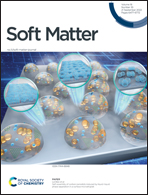Data storage and encryption with a high security level based on molecular configurational isomers†
Abstract
Developing advanced materials for highly secure data-encryption is crucial but very challenging, as most data-encryption materials (the message area) are chemically different from the substrates (the background) on which they are being written, leading to high risks of data leakage by deciphering via sophisticated instrumental analysis. Additionally, most materials require only one stimulus for decryption, resulting in a low-level of data-security. Here, a three configurational isomer-based data-encryption method is developed (i.e., propylamine, isopropylamine, and cyclopropylamine). Their similar molecular formulae, elemental constitution, and physiochemical properties make them ideal date-encryption materials. On the other hand, the significant differences in lower critical solution temperatures (LCST) of the corresponding polyacrylamides, i.e., 10 °C for poly(N-propylacrylamide), 32 °C for poly(N-isopropylacrylamide), and 53 °C for poly(N-cyclopropylacrylamide), respectively, render an effective method for data decryption. Relying on the above features, the data written by three isomers are well-hidden under given conditions. And a specific temperature range, rather than a simple temperature increase or decrease, would be required for decryption. Furthermore, undesired temperatures give wrong outputs, which is highly deceptive to the hacker. Therefore, a high-level of data security can be achieved. This result opens a new door for designing advanced materials for improving the data-security level.



 Please wait while we load your content...
Please wait while we load your content...